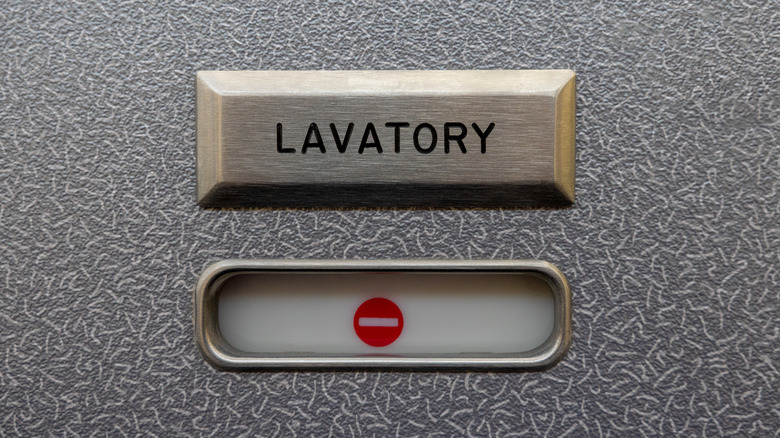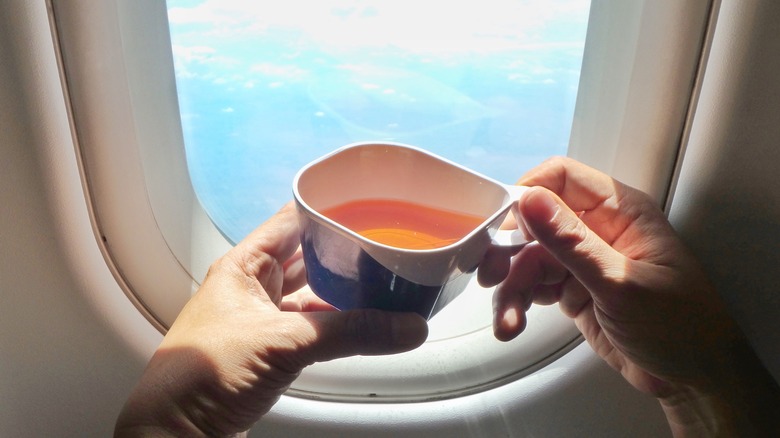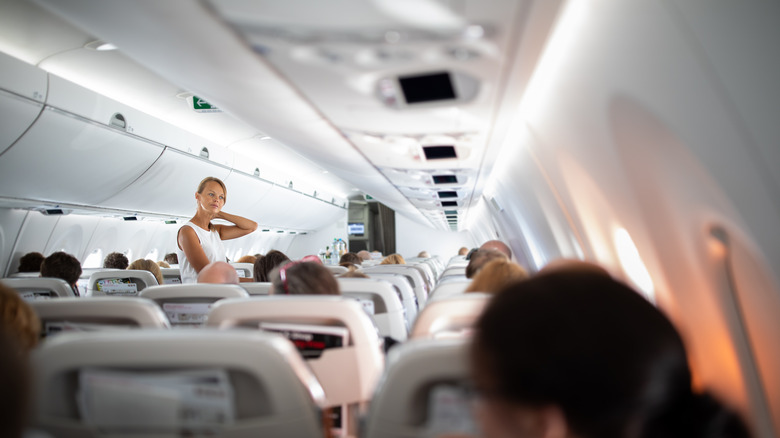Does This TikTok Hack Actually Reduce Bathroom Trips On Long Flights? A Doctor Tells Us
In an era where TikTok tips and tricks often go viral, travelers are always on the lookout for hacks that promise to make their journey smoother — from this hack to make your luggage weigh less to a packing method that saves space without sacrificing style. One such viral TikTok by @lauren.erro, which garnered around 254,000 likes, claims that drinking alkaline water can reduce the frequency of bathroom trips, especially on long flights. But does this claim actually hold any water (pun intended)?
Dr. Jason Singh, chief medical officer and physician at One Oak Medical, sheds some light on this viral suggestion and exclusively provides expert advice on how to stay hydrated while flying. The claim that alkaline water can decrease the need for bathroom breaks during flights has caught the attention of many. Alkaline water, which has a pH level above 7, is often touted for its health benefits, which purportedly include everything from detoxifying the body to enhancing hydration.
However, according to Dr. Singh, there is no scientific backing for the idea that it can reduce how often you need to urinate. "I have not come across any evidence of alkaline water to reduce urination on planes. The pH of water does not significantly affect urine output or hydration status," he explains. Dr. Singh emphasizes that the human body is adept at regulating its pH levels independently of the type of water consumed. Therefore, the idea that one can manipulate overall hydration or urine production through water pH levels seems unfounded.
Hydrating alternatives to alkaline water
For any flyers with a small bladder worried about frequent trips to the dreaded airplane toilet, Dr. Jason Singh recommends some other beverages that can help maintain fluid balance more effectively. "[You] may want to consider electrolyte-enhanced waters, as these contain added minerals like sodium and potassium," he suggests. Dr. Singh advises choosing brands that contain fewer than 25 calories per serving to avoid excess sugar intake. A sugar crash on a long-haul flight is no fun! In fact, the World Health Organization recommends less than 10% of daily energy intake should come from sugar, which is about 12 teaspoons per day. Sugar-free electrolyte powder added to regular water is also a great option recommended by flight attendants, plus you can easily store the small packets in your carry-on.
Another option suggested by Dr. Singh is unsweetened herbal teas, which offer hydration without the diuretic effects of caffeine found in regular tea and coffee. Chamomile tea, with its calming effects, is a good sleep aid if you want to knock out on a long international flight, while ginger tea has nausea and indigestion-relieving effects, which is especially helpful for flyers who often experience bloating and stomach pain. Dr. Singh also recommends plant-based milk, as it offers a blend of water, electrolytes, and nutrients that support overall hydration. Look for no-sugar-added, organic milk made of almond, soy, oat, or your other favorite alternative. Coconut water, fruit-infused water, and green smoothies are also good options.
Additional in-flight considerations
Staying hydrated on flights is crucial to ensure overall well-being. Dr. Jason Singh highlights the importance of avoiding alcohol and caffeinated drinks, which are known to be dehydrating. They're also drinks flight attendants wish you would stop ordering. Instead, Dr. Singh explains that passengers should sip fluids consistently throughout the flight rather than consuming large quantities all at once. This approach helps maintain hydration without suddenly overloading the bladder. "Eating hydrating foods like fruits and vegetables with a high water content is another alternative," Dr. Singh adds. Think watermelon, strawberries, and cucumbers — these can supplement fluid intake and provide essential nutrients during air travel.
Although making that trip to the washroom can be annoying, especially if you have the window or middle seat, that little walk down the aisle is actually crucial for your health. Holding in your pee and sitting for prolonged periods on a long-haul flight is dangerous and can increase your risk of deep vein thrombosis (DVT) or, worse, a pulmonary embolism. Even if you must "inconvenience" your seatmate, a walk once an hour, to the lavatory or not, is recommended. Travelers also need to remember that everyone's body is different, and what works for one person may not work for another. Factors like health conditions, medications, and personal hydration needs can influence how often one might need to use the lavatory during a flight. Indeed, sometimes travel TikTok gets it right, but more often than not, it really doesn't hold any water.


